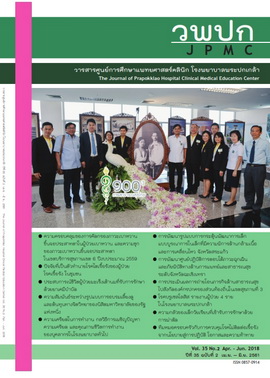Relationship between Parenting Styles and Psychological Capital among Students of a Public University
Main Article Content
Abstract
Background: Psychological capital (PsyCap) is a desirable attribute for undergraduates causing satisfaction in education a life which could be improved or changed. Also, parenting was a highly influential factor in personal development which may affect PsyCap.
Objective: This study aimed at finding the relationship between perceived parenting styles and psychological capital in undergraduates of a public university.
Materials and methods: Four hundred and two undergraduates of one public university in academic year 2016 were drawn by using a multi-stage random sampling method. The tools used were a parenting styles assessment form and Thai-Psychological Capital Inventory. The data was analyzed using basic statistical values, variance, Pearson correlation coefficient, and stepwise multiple regression.
Results: Undergraduates had moderately high psychological capital. Most perceived that they had been through authoritative parenting style. Psychological capital was different according to parenting style. Authoritative and permissive parenting styles had positive relationship with psychological capital while authoritarian and neglectful parenting styles had negative relationship with psychological capital with statistical significance. Authoritative parenting style could predict psychological capital with statistical significance.
Conclusions: Parenting style had influence on psychological capital and suitable parenting was a factor that could improve psychological capital among undergraduates.
Article Details
References
2. Surakarn A. The study of antecedents and consequences of psychological capital affect-ting authentic happiness and learning behavior of nursing students at Government University. Journal of Behavioral Science for Development 2014; 7(1):237-52.
3. Luthans BC, Luthans KW, Jensen SM. The impact of business school students’ psychological capital on academic performance. Journal of Education for Business 2012; 87:253-9.
4. Chonprai C, Phattrarayuttawat S, Ngamthipwatthana T. Psychological capital and mental health in students of Chulalongkorn University’s residence. In: Khon Kaen University. 15th Graduate Research Conference 2014 Mar 28. Khon Kaen: Khon Kaen University; 2014.p 1833-42.
5. Hsieh YL. A relational study of parenting styles and psychological capital for junior high school students in Taipei. Taipei: Ming Chuan University; 2010.
6. Kittitussaranee S. The relationship between parenting styles and depression of the forth level students in Nonthaburi province education service area office zone I. Rama Nurs J. 2009; 15:36-47.
7. Chitayasothorn D. Diana Baumrind’s Parenting Styles. University of the Thai Chamber of Commerce journal humanities and social sciences 2009; 29(4):173-87.
8. Tuntatead H, Phatharayuttawat S, Manusirivithaya V. The development of Thai-psychological capital inventory. J Psychiatr Assoc Thailand 2014; 59:73-83.
9. Scott MD, Radosevich DJ, Clesca CF. The underpinnings of PsyCap variance: An examination of goal orientation and dark side versus bright side personality dimensions. Review of Business Research. 2008; 8(6):160-170.
10. Qingquan P, Zongkui Z. Psychological capital, coping style and psychological health: An empirical study from college students. ICISE. 2009: 3391-3394.
11. Choomsai na Ayuthaya J. The student's identities of Srinakharinwirot University: The comparative study among students in different group of majors. Srinakharinwirot Research and Development Journal of Humanities and Social Sciences. 2013; 5(10): 1-13.
12. Karmakar R. Positive psychological capital and parenting styles among adolescents: Khasi and non-Khasi scenario. RJAP 2016; 18:47-52.

